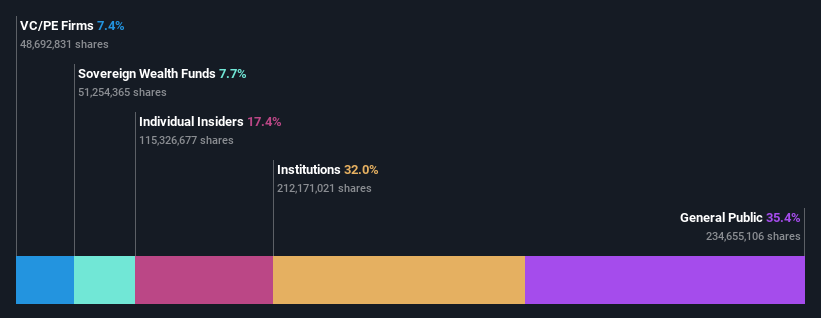Individual investors who hold 35% of Discovery Limited (JSE:DSY) gained 15%, institutions profited as well
Key Insights
Discovery's significant individual investors ownership suggests that the key decisions are influenced by shareholders from the larger public
A total of 9 investors have a majority stake in the company with 51% ownership
If you want to know who really controls Discovery Limited (JSE:DSY), then you'll have to look at the makeup of its share registry. And the group that holds the biggest piece of the pie are individual investors with 35% ownership. Put another way, the group faces the maximum upside potential (or downside risk).
While individual investors were the group that benefitted the most from last week’s R12b market cap gain, institutions too had a 32% share in those profits.
Let's take a closer look to see what the different types of shareholders can tell us about Discovery.
Check out our latest analysis for Discovery
What Does The Institutional Ownership Tell Us About Discovery?
Institutional investors commonly compare their own returns to the returns of a commonly followed index. So they generally do consider buying larger companies that are included in the relevant benchmark index.
We can see that Discovery does have institutional investors; and they hold a good portion of the company's stock. This can indicate that the company has a certain degree of credibility in the investment community. However, it is best to be wary of relying on the supposed validation that comes with institutional investors. They too, get it wrong sometimes. When multiple institutions own a stock, there's always a risk that they are in a 'crowded trade'. When such a trade goes wrong, multiple parties may compete to sell stock fast. This risk is higher in a company without a history of growth. You can see Discovery's historic earnings and revenue below, but keep in mind there's always more to the story.
Discovery is not owned by hedge funds. With a 13% stake, CEO Adrian Gore is the largest shareholder. For context, the second largest shareholder holds about 7.7% of the shares outstanding, followed by an ownership of 7.4% by the third-largest shareholder.
We also observed that the top 9 shareholders account for more than half of the share register, with a few smaller shareholders to balance the interests of the larger ones to a certain extent.
While studying institutional ownership for a company can add value to your research, it is also a good practice to research analyst recommendations to get a deeper understand of a stock's expected performance. There are a reasonable number of analysts covering the stock, so it might be useful to find out their aggregate view on the future.
Insider Ownership Of Discovery
The definition of an insider can differ slightly between different countries, but members of the board of directors always count. Company management run the business, but the CEO will answer to the board, even if he or she is a member of it.
I generally consider insider ownership to be a good thing. However, on some occasions it makes it more difficult for other shareholders to hold the board accountable for decisions.
It seems insiders own a significant proportion of Discovery Limited. Insiders own R15b worth of shares in the R88b company. That's quite meaningful. Most would be pleased to see the board is investing alongside them. You may wish to access this free chart showing recent trading by insiders.
General Public Ownership
The general public, who are usually individual investors, hold a 35% stake in Discovery. This size of ownership, while considerable, may not be enough to change company policy if the decision is not in sync with other large shareholders.
Private Equity Ownership
With a stake of 7.4%, private equity firms could influence the Discovery board. Some might like this, because private equity are sometimes activists who hold management accountable. But other times, private equity is selling out, having taking the company public.
Next Steps:
While it is well worth considering the different groups that own a company, there are other factors that are even more important. Take risks for example - Discovery has 2 warning signs we think you should be aware of.
If you are like me, you may want to think about whether this company will grow or shrink. Luckily, you can check this free report showing analyst forecasts for its future.
NB: Figures in this article are calculated using data from the last twelve months, which refer to the 12-month period ending on the last date of the month the financial statement is dated. This may not be consistent with full year annual report figures.
Have feedback on this article? Concerned about the content? Get in touch with us directly. Alternatively, email editorial-team (at) simplywallst.com.
This article by Simply Wall St is general in nature. We provide commentary based on historical data and analyst forecasts only using an unbiased methodology and our articles are not intended to be financial advice. It does not constitute a recommendation to buy or sell any stock, and does not take account of your objectives, or your financial situation. We aim to bring you long-term focused analysis driven by fundamental data. Note that our analysis may not factor in the latest price-sensitive company announcements or qualitative material. Simply Wall St has no position in any stocks mentioned.
Have feedback on this article? Concerned about the content? Get in touch with us directly. Alternatively, email editorial-team@simplywallst.com

 Yahoo Finance
Yahoo Finance 

